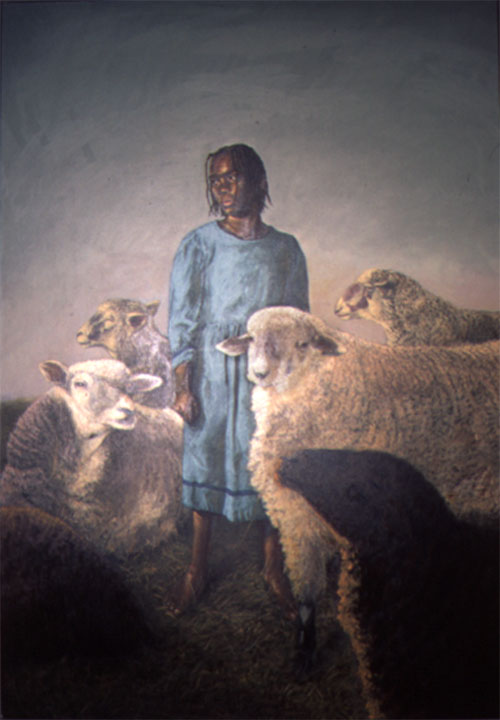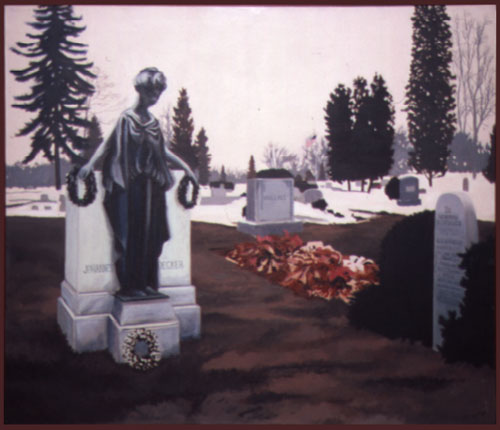|

SOJOURNER…SELF-ACTUALIZER By: Rella W. Hawkins Black History term paper 1970
I've selected a term paper written in 1970 to celebrate Black History month in this year 2000. My inspiration came from the book, "JOURNEY TOWARD FREEDOM, The Story of Sojourner Truth" by Jacqueline Bernard. This quote appears on the back cover by, FRIENDS JOURNAL: "This may be worth reading for its reminder that occasionally an indomitable human spirit does triumph over seemingly insuperable obstacles."
I chose Abraham Maslow's heirarchy of needs to explore the life of Sojourner Truth. My first awareness of her was in Leone Bennett's book, "Before the Mayflower" who was described as an exceptional black woman born in 1778 died in 1883 at the age of 105. In Bernard's biography: Sojourner Truth was revealed as very extraordinary woman in her day and I sensed she was a Self-actualization woman. Maslow proposed that an individual who is Self-actualized possess certain fundamental motives that are arranged in the ascending hierarchy of five levels:
1) Physiological; A person's physiological needs' forms the most basic level of motivation and proponent over the other needs. The needs to be met at the first level include: hunger, thirst and sex, as well as needs for sleep, relaxation, and bodily integrity. Sojourner's parents had been through various traumatic experiences of having their children sold or taken out of their hands. Sojourner was blessed with having these concerned parents during her formative years. The parents had only love to give her. Their prior conditioning of having other children taken away, they were prepared to be very generous with their love for Sojourner, meeting her physiological needs. They were able to nurture her, feed her, and give her a place of comfort comparable to the living conditions of her time. 
The second need is Safety. Sojourner's safety needs were not based on money
nor material objects. These were unnecessary for the making up her
security…but safety needs do require the presentation of a predictable and
orderly world. The love and protection by Sojourner's parents presented her
with a world in which she did feel secure, trustful, and was offered
stability. I am not saying the world for her was stable secure and trustful,
I am saying the love and security she felt with her parents was, in turn, how
she was capable of handling her world, with predictable, orderly, stable,
secure, and trustful approach. After all, Sojourner's life as a slave had a
very limited scope. Her formative years within the scope of this limitation
were attributable to Sojourner's fulfillment. The manner in which Sojourners parents struggled to hold their scattered children together was encultured in Sojourner, in that their lives were of great value, and with value endowed upon all her siblings, she would automatically be under the impression everyone's life had the same total value. I don't think that she comprehended the fact that slaveholder's could beat, torture, or deplete an individual of their Self-respect or Self-image. She saw her parents live with dignity, honesty, and purity, depending upon themselves for their resources in time of traumatic recourses. Her life was principled likewise. The only thing that Sojourner and her parents thought that they had to believe in, was some God up in the sky. They believed in themselves. With Sojourner's Physiological and Safety needs met she was capable of responding to the third need-the Love and Belongingness need. I do not think that Sojourner ever felt unloved. I'm not saying that she was never lonely, I am saying I feel she never experienced thinking that she could be unlovable. When a husband was chosen for her she responded to him in a mature and loving way. When their children were born to her, these children were nurtured with the same secure Love and Belongingness need that was met by Sojourner with her parents. This prepared Sojourner's children, too, as secure mature people who were not uptight, or devastated, when Sojourner had to leave them. That is, with the exception of her son Peter. The point in Peter's life-as well as the severity of the experience, took its adverse effect upon him for the rest of his life. No doubt Sojourner was able to give of herself to her chidrens' needs in that they, too, had high Self-esteem. The fourth need deals with Self-esteem. This need was ready to be met by Sojourner because her Love and Belongingness need was met with her fairly well, also, and, it was reciprocated in nearly all the people that she worked for. It would be hard to say if Sojourner was born with her strength, achieving abilities, mastery, her competence, independence, and desire for Freedom, and the reciprocal respect for others, or, if it was because of the prior needs having been satisfactorily met. These traits did lead to recognition, admiration, status, importance, and appreciation, which constitutes Self-esteem I have titled this paper, "Sojourner-The Self-Actualizer" because she was meeting Maslow's fifth need of Self-actualization. With all lower needs met she now had the ability to fully use and to exploit her surfacing talents and capabilities. Even though Sojourner was illiterate, she had a Self-image of herself that was never absent of power, a quick, incisive mind that reduced things to the essential. She was a preacher, a seer, and a teacher. There were labels for making a distinction between "talking" abolitionists and "acting" abolitionists, and Sojourner was known as a "talking abolitionist. Leone Bennett said, "Sojourner was so complex that no one paragraph or book would cover her. She burned for love of the world. Even when she spoke up for herself and her children, she felt like she had the power of the world within her."

Bennett noted when Sojourner was around age 46 she became dissatisfied with
her way of life. She had nothing to show for all her work. It had not
helped her or those she loved. She found that she was far closer to God than
to the masters for whom she worked. She could feel a new growth pushing up,
a growth that she knew would be far more beautiful than the old. It was
within this time period she decided to go east and to take a new name. She
became Sojourner Truth. She was no longer the woman who had been born and
known as Isabelle. She tramped on into Massachusetts, working, lecturing, and always singing. She stayed with a commune in North Hampton, Massachusetts for three years. It was at that time Clive Gilbert wanted to help her write her life's story. She was going to sell the book at her speaking engagements, so once again she stepped back on the road. She had been a slave. She had been freed…through her own efforts. Now she would help free others. Sojourner accepted an invitation to serve as a delegate from Massachusetts to the First National Woman's Rights Conventions. She told the women, "Sisters, I'm not clear what you be after. If women want any rights more that they've got, why don't that just take them and not be talking about it?" She spoke from Massachusetts to New York. She was the first speaker on the program in Syracuse, NY. The crowd was screaming in displeasure. She got up, raised her arms to quiet the audience. "I'll tell you what they's going to say, they's going to argue that the poor Negroes ought to be out of slavery and in the heavenly state of Freedom. But, children, I'm here to tell you that I'm against slavery because I want to keep the white folks who hold slaves from getting sent straight to hell." Then there was silence. Sojourner went on a speaking tour down the Eire Canal to Rochester, NY, on to Akron, Ohio, to the Akron Woman's Rights Convention. She worked with the Reverend Henry Highland Garnet for the Colored Soldiers Aid society. For the National Freedman's Relief Association; Freedman's Hospital; she campaigned to give land to ex-slaves' went to Kansas for land for the ex-slaves; went back to Michigan, voted and campaigned for General Grant; and she was a delegate from Michigan for the 13th Woman's Rights Convention in NY. Nine years after Sojourner campaigned for the ex-slaves to have land in Kansas, over 60,000 Southern slaves arrived. The Governor invited freedmen to the state. Sojourner went back to Kansas to see that her people were properly settled.

She died at age 105 in November 1883. She had lived most of her life in
Self-Actualization. Once long before her death someone said to her, "Suppose there is no Heaven, what if you didn't get there, what would you say?" Sojourner replied, "Bless the Lord, I sure had a good time thinking I would." ***in peace and love…rell
|